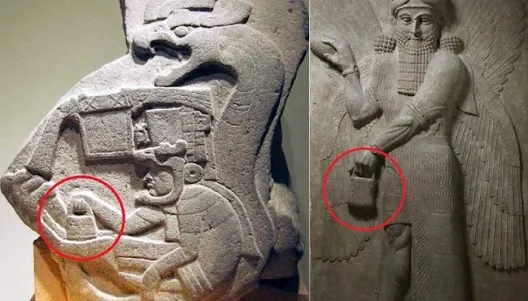The “Bag of the Gods” is a captivating motif found across various ancient civilizations, puzzling historians and enthusiasts alike. How did disparate cultures, separated by oceans and continents, come to depict their deities bearing this enigmatic object? Let’s dive into this ancient mystery.

A Common Thread in Diverse Cultures
The Mesopotamian Enigma
In ancient Mesopotamia, the cradle of civilization, deities are often depicted carrying a peculiar bag, alongside another curious item—a “wristwatch.” This depiction raises eyebrows, considering the vast geographical distances and cultural differences with other civilizations that shared this motif.
The Mesoamerican Connection
Fast forward thousands of miles to the ancient Americas, where civilizations like the Maya, Aztecs, and Olmecs portrayed their gods with a similar handbag. The presence of this motif in both the New and Old Worlds is striking.

The Significance of the “Handbag”
What could this recurring symbol represent? Theories range from it being a container of knowledge and wisdom, to a symbol of divine authority, or even a practical tool for carrying the seeds of life across civilizations.
Architectural and Artistic Depictions
Olmecs to Toltecs
From the Olmec civilization’s depiction of Quetzalcoatl holding the mysterious bag at La Venta, to the Toltec Empire’s massive Atlantean statues in Tula clutching the same object, the motif’s persistence is undeniable.
Gobekli Tepe’s Ancient Message
The ancient site of Gobekli Tepe in Turkey, with its megalithic stone pillars, also features this enigmatic bag. Its presence here, in one of the oldest known megalithic temples, adds another layer of mystery to its significance.

A Global Connection?
The widespread depiction of this motif suggests a possible interconnectedness among these ancient civilizations. Could it be that they were all influenced by a common source, or even visited by the same “gods”?
The Anunnaki Link
Some speculate that the Anunnaki of Sumerian lore, often depicted with the bag, might be the same deities worshiped in other ancient cultures. This connection could hint at a shared ancient history or knowledge passed down through generations.

Conclusions
The “Bag of the Gods” remains one of history’s most intriguing mysteries. Its presence across various civilizations that supposedly had no contact with each other challenges our understanding of ancient history. Whether it was a symbol of divine presence, a tool of the gods, or a container of ancient wisdom, its true purpose and significance continue to elude us.
For those fascinated by the mysteries of the ancient world and the shared motifs across diverse cultures, the “Bag of the Gods” serves as a compelling reminder of our interconnected past.




No comments